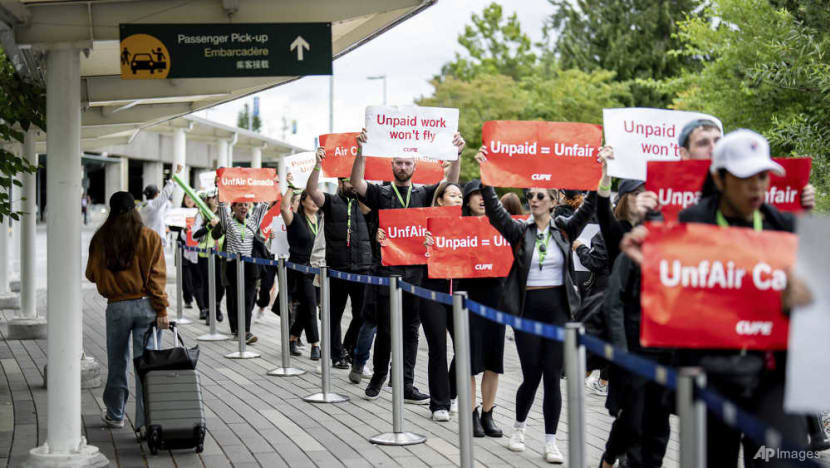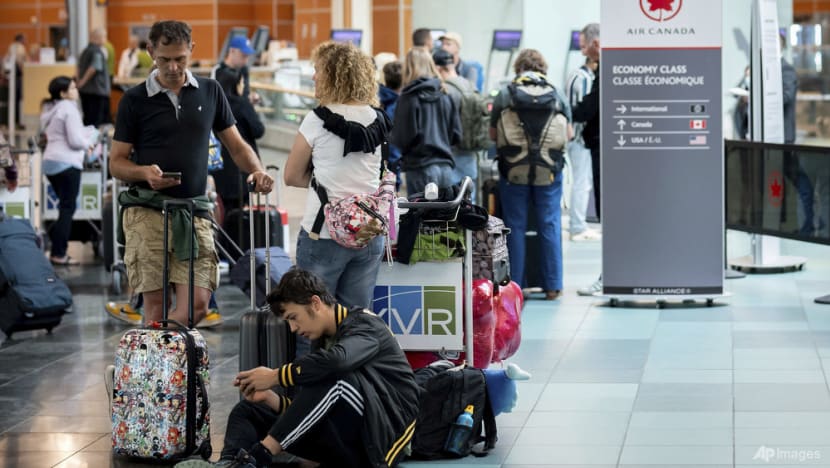Canadian government moves to end Air Canada strike, seeks binding arbitration

A traveller walks past striking Air Canada flight attendants at Vancouver International Airport in Richmond, British Columbia, Canada, Aug 16, 2025. (Photo: Ethan Cairns/The Canadian Press via AP)
OTTAWA: The Canadian government on Saturday (Aug 16) moved to end a strike by Air Canada's cabin crews and require binding arbitration to break their contract impasse, an action that the country's largest carrier had sought but unionized flight attendants fiercely opposed.
Thousands of Air Canada flight attendants walked off the job just before 1am ET (1pm, Singapore time), after months of negotiations over a new contract. In anticipation of the stoppage, the airline canceled nearly all of its 700 daily flights, forcing more than 100,000 travelers to scramble for alternatives or stay put.
The most contentious issue in the contract negotiations has been the union's demand for compensation for time spent on the ground between flights and when helping passengers board. Attendants are currently paid only when their plane is moving.
Jobs Minister Patty Hajdu said at a news conference she had asked the Canada Industrial Relations Board to impose binding arbitration on both sides and order an immediate end to the strike. Still, it may take days before the board grants the request and for the airline to fully restore its operations.
"This is not a decision that I've taken lightly, but the potential for immediate negative impact on Canadians and our economy is simply too great," Hajdu said.
Air Canada had asked Prime Minister Mark Carney's minority Liberal government to make the request, but the Canadian Union of Public Employees said it wanted a negotiated solution, as binding arbitration would take pressure off the airline.
The minister said the government preferred negotiated settlements to labor disputes, but the current impasse showed the two sides would not find a solution soon enough to spare the economy further damage.
She said Canada had already experienced "unprecedented attacks on trade," referring to tariffs imposed by the Trump administration on US-bound shipments.
Minutes after the announcement, CUPE blasted the government's decision.
"The Liberal government is rewarding Air Canada's refusal to negotiate fairly by giving them exactly what they wanted," it said in a statement posted on X.
Henly Larden, an Air Canada flight attendant and a vice-president at CUPE, called the government’s move "incredibly disgusting."
"Air Canada should come and join us in good faith and address the matters that really resonate with our members,” a visibly emotional Larden said in a shaken voice at Vancouver airport.
Air Canada had no immediate comment about Hajdu's decision, saying "it is premature to comment as the CIRB process is underway."
CUPE spokesperson Hugh Pouliot told Reuters that the strike will end only when the CIRB issues binding arbitration notice to the parties, which could take a few days.
Air Canada also said it was premature to comment about restarting the airline. Earlier it indicated it would take four to five days to resume full operations, Hajdu said, assuming the board granted the government's request, which it usually does.
While passengers have generally voiced support for the flight attendants on social media, Canadian businesses, already reeling from a trade dispute with the US, have urged the federal government to impose binding arbitration and cut short the strike.

"With both parties declaring an impasse in negotiations, with valuable cargo grounded and passengers stranded, the government made the right decision to refer the two sides to binding arbitration," Matthew Holmes, chief of public policy for the Canadian Chamber of Commerce, said in a statement.
WAGE DISPUTE
While the most contentious topic was compensation for time spent on the ground, there was also disagreement over broader wage issues. The carrier had offered a 38 percent increase in total compensation for flight attendants over four years, with a 25 percent raise in the first year, which CUPE said was insufficient.
The union has said Air Canada offered to compensate flight attendants for some work that is now unpaid at 50 percent of their hourly rate.
A source close to the negotiations told Reuters the union was looking for parity on wages with Canadian leisure carrier Air Transat. Its flight attendants approved a contract last year that provided for total compounded increases of 30 percent over five years, making them the highest paid in the industry in Canada.
Air Canada did not confirm if such a proposal had been put forth by the union.
Wesley Lesosky, president of the Air Canada component of CUPE, said in a press conference in Toronto earlier on Saturday that there were no bargaining sessions scheduled between the two sides, which have held on-and-off negotiations for months.
Earlier in the day outside Toronto Pearson International Airport, the country's busiest, hundreds of cabin crew waved flags, banners and picket signs. Union officials called on members to assemble outside all of the country's major airports, including in Toronto, Montreal, Calgary and Vancouver.
Montreal-based Air Canada had said the suspended flights included those operated by its budget arm, Air Canada Rouge. Flights by Air Canada's regional affiliates - Air Canada Jazz and PAL Airlines - were operating as usual.
Hajdu told reporters she had also asked the country's industrial relations board to extend the terms of the existing collective agreement until a new one is determined by the arbitrator.
The Canada Labour Code gives the government the right to ask the industrial relations board to impose binding arbitration in the interests of protecting the economy.
Under Justin Trudeau, Carney's predecessor, the government intervened quickly last year to head off rail and dock strikes that threatened to cripple the economy.















